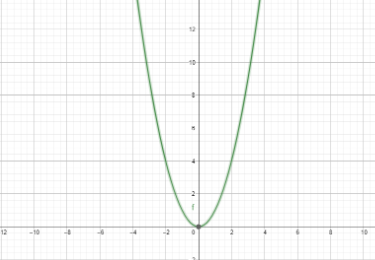
If $f(x) = {x^2}$ then find the value of $\dfrac{{f(1.1) - f(1)}}{{1.1 - 1}}$.
Answer
590.7k+ views
Hint: We have given the function f(x) then using this function we will find the values that will be required in finding the solution i.e. finding the value of the expression $\dfrac{{f(1.1) - f(1)}}{{1.1 - 1}}$, so basically we will find $f(1.1)$ and $f(1)$, then substituting those values in the given expression we will get the answer that is required.
Complete step by step solution: Given $f(x) = {x^2}$

$f(x) = {x^2}$
Now, Substituting \[x = 1.1\], we get,
$ \Rightarrow f(1.1) = {(1.1)^2}$
$ \Rightarrow f(1.1) = (1.1)(1.1)$
On squaring we get,
$\therefore f(1.1) = 1.21$
Now, substituting \[x = 1\] in $f(x) = {x^2}$, we get,
$ \Rightarrow f(1) = {(1)^2}$
On squaring we get,
$\therefore f(1) = 1$
Now substituting the value of $f(1.1)$ and $f(1)$ in the expression which we have to find i.e. $\dfrac{{f(1.1) - f(1)}}{{1.1 - 1}}$
$ \Rightarrow \dfrac{{f(1.1) - f(1)}}{{1.1 - 1}} = \dfrac{{1.21 - 1}}{{1.1 - 1}}$
On Simplifying the numerator and the denominator, we get,
$ \Rightarrow \dfrac{{f(1.1) - f(1)}}{{1.1 - 1}} = \dfrac{{0.21}}{{0.1}}$
On Multiplying 10 on numerator and denominator, we get,
$ \Rightarrow \dfrac{{f(1.1) - f(1)}}{{1.1 - 1}} = \dfrac{{2.1}}{1}$
Therefore, $\dfrac{{f(1.1) - f(1)}}{{1.1 - 1}} = 2.1$
Note: Note: An alternative method for the solution of this question can be using the derivative as we know that $\dfrac{{f(x) - f(y)}}{{x - y}}$ is the slope of the graph between f(x) and f(y) but the function we have given in the equation of do not have a constant slope and changes with every value of x so we’ll write it as the average of the slopes at x and y i.e. $\dfrac{{f(x) - f(y)}}{{x - y}} = \dfrac{{f'(x) + f'(y)}}{2}$.

Therefore we can say the value of $\dfrac{{f(1.1) - f(1)}}{{1.1 - 1}}$ will b equal to $\dfrac{{f'(1.1) + f'(1)}}{2}$
On differentiating f(x)
$f'(x) = 2x$
Substituting x=1.1
$ \Rightarrow f'(1.1) = 2(1.1)$
$\therefore f'(1.1) = 2.2$
Substituting x=1
$ \Rightarrow f'(1) = 2(1)$
$\therefore f'(1) = 2$
Now, $\dfrac{{f'(1.1) + f'(1)}}{2} = \dfrac{{2.2 + 2}}{2}$
$ = \dfrac{{4.2}}{2}$
$ = 2.1$, which is giving the same result as the above solution.
Complete step by step solution: Given $f(x) = {x^2}$

$f(x) = {x^2}$
Now, Substituting \[x = 1.1\], we get,
$ \Rightarrow f(1.1) = {(1.1)^2}$
$ \Rightarrow f(1.1) = (1.1)(1.1)$
On squaring we get,
$\therefore f(1.1) = 1.21$
Now, substituting \[x = 1\] in $f(x) = {x^2}$, we get,
$ \Rightarrow f(1) = {(1)^2}$
On squaring we get,
$\therefore f(1) = 1$
Now substituting the value of $f(1.1)$ and $f(1)$ in the expression which we have to find i.e. $\dfrac{{f(1.1) - f(1)}}{{1.1 - 1}}$
$ \Rightarrow \dfrac{{f(1.1) - f(1)}}{{1.1 - 1}} = \dfrac{{1.21 - 1}}{{1.1 - 1}}$
On Simplifying the numerator and the denominator, we get,
$ \Rightarrow \dfrac{{f(1.1) - f(1)}}{{1.1 - 1}} = \dfrac{{0.21}}{{0.1}}$
On Multiplying 10 on numerator and denominator, we get,
$ \Rightarrow \dfrac{{f(1.1) - f(1)}}{{1.1 - 1}} = \dfrac{{2.1}}{1}$
Therefore, $\dfrac{{f(1.1) - f(1)}}{{1.1 - 1}} = 2.1$
Note: Note: An alternative method for the solution of this question can be using the derivative as we know that $\dfrac{{f(x) - f(y)}}{{x - y}}$ is the slope of the graph between f(x) and f(y) but the function we have given in the equation of do not have a constant slope and changes with every value of x so we’ll write it as the average of the slopes at x and y i.e. $\dfrac{{f(x) - f(y)}}{{x - y}} = \dfrac{{f'(x) + f'(y)}}{2}$.

Therefore we can say the value of $\dfrac{{f(1.1) - f(1)}}{{1.1 - 1}}$ will b equal to $\dfrac{{f'(1.1) + f'(1)}}{2}$
On differentiating f(x)
$f'(x) = 2x$
Substituting x=1.1
$ \Rightarrow f'(1.1) = 2(1.1)$
$\therefore f'(1.1) = 2.2$
Substituting x=1
$ \Rightarrow f'(1) = 2(1)$
$\therefore f'(1) = 2$
Now, $\dfrac{{f'(1.1) + f'(1)}}{2} = \dfrac{{2.2 + 2}}{2}$
$ = \dfrac{{4.2}}{2}$
$ = 2.1$, which is giving the same result as the above solution.
Recently Updated Pages
Master Class 11 Computer Science: Engaging Questions & Answers for Success

Master Class 11 Business Studies: Engaging Questions & Answers for Success

Master Class 11 Economics: Engaging Questions & Answers for Success

Master Class 11 English: Engaging Questions & Answers for Success

Master Class 11 Maths: Engaging Questions & Answers for Success

Master Class 11 Biology: Engaging Questions & Answers for Success

Trending doubts
One Metric ton is equal to kg A 10000 B 1000 C 100 class 11 physics CBSE

There are 720 permutations of the digits 1 2 3 4 5 class 11 maths CBSE

Discuss the various forms of bacteria class 11 biology CBSE

Draw a diagram of a plant cell and label at least eight class 11 biology CBSE

State the laws of reflection of light

Explain zero factorial class 11 maths CBSE




